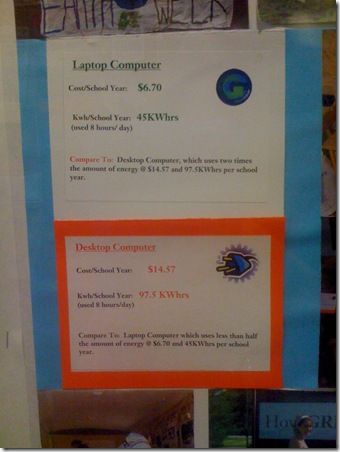Sales of SUVs of the PC world – stationary PCs – are being beaten out by the more energy efficient mobile PCs. Of course, this shift to the rise of mobile PCs has been happening for a while. What is different is the relevance to U.S. college students of a PC being energy efficient, contributing as little to environmental impact as possible from production to degradation, and hopefully from companies that participate in fair trade (or at least those working toward it).
Over the next several weeks entering college students will be introduced to the values of their new communities and enter into an action oriented environment around sustainability. From contests between dorms to other campuses, many students will stop using trays in the cafeteria on certain days (or at all), counting the minutes they’re in the shower to stay under 10 or 6 min, using the common dorm fridge instead of bringing mini-fridges, buying veggies locally (organic) or growing their own, composting, and yes, even counting the energy consumption on their PCs all to contribute to building a more sustainable environment.
Awareness and action by academics has increased from simple "reduce, reuse, recycle" plastic mugs for soda and coffee to signing pledges, like at Duke University and actively helping the campus install solar panels, like at Dickinson College. Tomorrow’s New York Times has a great article detailing the movement on campuses across the U.S. and a new rating by Princeton Review.
Students and faculty working together to build more sustainable systems is serious business and not to be scoffed at as an idealistic dream. In order to maintain relevance to these leaders of sustainability and our future political and business leaders, PC and device manufacturers will need to be honest in their approach to the effort. Marketing gimmics won’t fly, as this new effort is beyond, "we’ll recycle your old PC," euphemism for they’ll take it back and either resell it as refurbished or pay the dump fee.
Currently, students are making their PC decisions at a very practical level. I recently had the opportunity to visit well over a dozen colleges and prep schools and repeatedly heard students’ comments supporting use of mobile PCs in context of energy, rather than convenience of using around campus. Here is a photo of a poster that I noticed in one hallway, which demonstrates the energy cost differences between average stationary PCs and mobile PCs:
Mobile PCs are a wonderful tool to aid in creating a more sustainable environment. Every school I visited mentioned that the students can now print on two sides of paper from network printers. Students commented on how much this has helped them reduce use of paper and network printer access means they don’t have to bring their own printer. Paper is fundamental to many academic processes, even today, and it’s good to see that this basic is not overlooked.
Of course, there can be even further efforts with PCs helping schools to be less dependent on paper.
There are also software features like being able to handwrite formulas, equations, and notes directly into Tablet PCs. This can be helpful for lab research, as well as individual course notes.
At an institution level there are Learning Management Systems that can help reduce the need to even print an assignment out. With an efficient LMS in place, students can post work electronically and faculty can access it. I noticed that schools use these at varying levels. Based on anecdotes only, this appeared to be based on training more than on the status of the technology available to the students.
Operationally, institutions can also standardize on hardware to help reuse pieces of PCs that are undergoing maintenance. Reuse a battery from a mobile PC that has a broken keyboard, for example. This is easier to do if the majority of equipment is the same.
I’ll go into more detail around these in Part II. Also, we can go over needed improvements for tomorrow, such as battery duration, more eco-friendly plastics, and more energy efficient chipsets and processors.

